Interview with Erin Hartman
A Conversation with Erin Hartman, Project Manager and Managing Editor
Where were you born and raised? Would you share something about your family history?
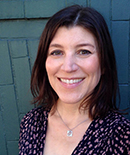 I was born and raised in Michigan but also briefly lived in Ohio, Florida. I went to college in Michigan, then grad school in Boston before moving to San Francisco. What I know of the Hartman family only goes back to my Grandpa Rudy. He and his twin sister, Betty, came to the US by way of Hamburg, Germany, before they could walk. They were the youngest of 11 children in a family that had escaped from Russia (now Belarus) during the pogroms. My great-grandfather first sent the elder sons to live with relatives in New York and then the rest of the family joined them. At the age of 91, my grandfather and his twin sister went to Ellis Island to find their own records. I remember him showing it to me, as after his trip he kept a folded copy in his wallet. Many years later, I also took the tour and found their records. It was remarkable to learn what a complicated process it was to get through Ellis Island (at any point during which they could be denied entry) before being accepted into the country. The history we have for his wife, my grandma Sally, goes back much further. The fourth of 10 children, she grew up on a farm in Maryland and became a nurse anesthetist. She descends from four families originally from England: Bond, Taylor, Brown, and Hall, who were given land grants in Maryland in the 1600s. (Perhaps the most recognizable descendant of these families was Zachary Taylor, the twelfth President.) When I traveled to England, I learned that one ancestor was buried at Westminster Abbey. At King's College in Cambridge, England, I sat in the same chapel, maybe even the same pew, as an ancestor who taught there in the 1500s. The history goes back even further: another ancestor was supposedly right-hand man to William the Conqueror. (Sorry, England.)
I was born and raised in Michigan but also briefly lived in Ohio, Florida. I went to college in Michigan, then grad school in Boston before moving to San Francisco. What I know of the Hartman family only goes back to my Grandpa Rudy. He and his twin sister, Betty, came to the US by way of Hamburg, Germany, before they could walk. They were the youngest of 11 children in a family that had escaped from Russia (now Belarus) during the pogroms. My great-grandfather first sent the elder sons to live with relatives in New York and then the rest of the family joined them. At the age of 91, my grandfather and his twin sister went to Ellis Island to find their own records. I remember him showing it to me, as after his trip he kept a folded copy in his wallet. Many years later, I also took the tour and found their records. It was remarkable to learn what a complicated process it was to get through Ellis Island (at any point during which they could be denied entry) before being accepted into the country. The history we have for his wife, my grandma Sally, goes back much further. The fourth of 10 children, she grew up on a farm in Maryland and became a nurse anesthetist. She descends from four families originally from England: Bond, Taylor, Brown, and Hall, who were given land grants in Maryland in the 1600s. (Perhaps the most recognizable descendant of these families was Zachary Taylor, the twelfth President.) When I traveled to England, I learned that one ancestor was buried at Westminster Abbey. At King's College in Cambridge, England, I sat in the same chapel, maybe even the same pew, as an ancestor who taught there in the 1500s. The history goes back even further: another ancestor was supposedly right-hand man to William the Conqueror. (Sorry, England.)
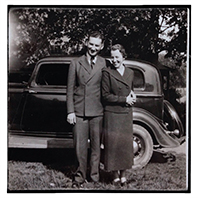
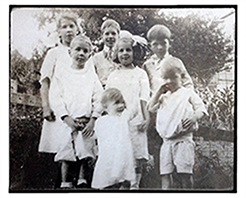
How long have you been with UCSF? Among your many achievements in editing, is there something of which you are particularly proud?
It is my thirteenth anniversary at UCSF! I am proud of the sheer volume of work that I've edited; now somewhere around 700 articles. One of the best compliments I ever received was being called an alchemist for my editing work.
What was your original interest in linguistics and how did it evolve into what you do professionally?
What really grabbed me about linguistics was its analytical aspect. I'd always loved math and science. In math, when you're given a problem, you already have the formula to solve it. In computer science, you are given the problem and you must figure out the formula to solve it. In linguistics, you are given a hunk of data and you have to figure out the problem, the formula, and the solution. Linguistics analyzes language in great detail: phonemes, syntax, logic, the unit of meaning, etc. I adored that. My interest piqued with a child language development course taken after I spent a summer caring for my 14-month-old cousin and godchild. I found his language acquisition fascinating and wound up doing an honors thesis on his acquisition of pragmatics, the branch of linguistics dealing with language use and meaning in context. As far as my career path into editing—I've never come at editing the way I imagine an English major might, I approach it from a linguistic standpoint through syntax and discourse analysis. With ever-present word limits in medical and scientific writing, one of my favorite pastimes is shortening manuscripts without sacrificing the meaning or message. My job is to make it clear and engaging, while keeping it in the writer's voice and enhancing it. That is why I do what I do; editing for me is a fun form of problem solving.
What is Ultimate Frisbee and how good are you?
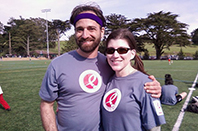
Ultimate Frisbee is a team sport played on a soccer field, but it's a little more like football. To advance down the field, the handler throws the disc to an open receiver, and that receiver in turn must throw the disc to the next person. The difference is that, unlike in football, when you catch it you must stop running and throw the disc to someone else. There are lots of opportunities for turnovers, but you score by catching the disc in the end zone. People who have played soccer, football, field hockey, lacrosse, or other field sports come to Ultimate with a better field sense than someone like me who did gymnastics. It took me longer to develop even a vague field sense, but I finally "got" it when I related it to driving in traffic or navigating through a crowd: seeing openings and cutting through. Plenty of players are younger and faster, but I do consider myself decent at throwing the disc. Ultimate is really more about good sportsmanship, spirit of the game, and just having fun. I've played for 10 years. This weekend is our 6th annual Huck Cancer Ultimate Frisbee Tournament benefiting LiveStrong in honor of a friend who was diagnosed with a grade 4 glioblastoma multiforme in July of 2009. LiveStrong helps people with all kinds of cancer with their everyday lives: support, staying active, connecting people with clinical trials, preserving fertility, and camps for kids whose parents have cancer. Keeping our friend's memory alive through Ultimate and Huck Cancer is incredibly important to me.
One of your color images is in the conference room. Do you still do photography?
Most of my photography now revolves around knitting. In 2004, when my mom got cancer for the last time, she was pretty bored in the hospital and asked for some knitting materials, but ended up showing me how to knit instead. Knitting was a way to remember and honor my mom after she passed, and I love knitting gifts for people. More recently, I started designing too. As an editor, I feel it is my duty to write clear patterns that provide everything you need to succeed. Hundreds of people have obtained my patterns and while I certainly love the designs, I am more proud of the fact that not once have I been asked a question about my instructions! To me, that is a triumph.
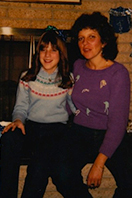
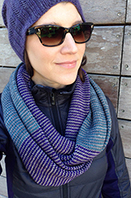
How fun is it to not be yourself? What's the best character you've ever created?
I did plays and speech team in high school, sketch comedy in college, improvisation, and even standup. I'm still in touch with friends from my college sketch comedy troupe, but I no longer have any interest in performing. I later applied those skills as a volunteer peer educator at the University of Michigan and more recently teaching writing to physicians; that kind of interaction is much more my style. I find it more rewarding.
Give me three adjectives that you think best describe your complexity.
Feisty. Loyal. Sincere.
You are indeed. Thank you, Erin.
- by Oralia Schatzman
View Erin's professional bio | See previous interviews
